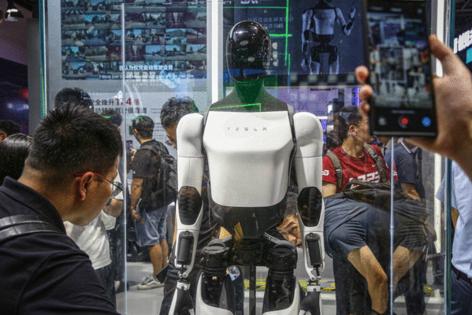Tyler Cowen: AI's effect on the US economy will be wildly uneven
Published in Op Eds
One of the only things growing faster than progress in AI applications is speculation about AI’s effect on the economy. I don’t have all the answers, not by a long shot, but I do think we should expect great unevenness in adaptation, and that itself will alter our world.
To see how this is likely to play out, start with a distinction between sectors in which it is relatively easy to go out of business, and sectors in which it is not. Most firms selling computer programming services, for example, do not typically have guaranteed customers or revenue, at least for long. Employees have to deliver, or they and their company will be replaced. The same is true of most media companies: If they lose readers or customers, their revenue disappears. There is also relatively free entry into the sector in the U.S., due to the First Amendment.
Another set of institutions goes out of business only slowly, if at all. If a major state university does a poor job educating its students, for example, enrollment may decline. But the institution is still likely to be there for decades more. Or if a nonprofit group does a poor job pursuing its mission, donors may not learn of its failings for many years, while previous donors may pass away and include the charity in their wills. The point is, it can take a long time for all the money to dry up.
Which leads me to a prediction: Companies and institutions in the more fluid and competitive sectors of the economy will face heavy pressure to adopt AI. Those not in such sectors, will not.
It is debatable how much of the U.S. economy falls into each category, and of course it is a matter of degree. But significant parts of government, education, health care and the nonprofit sector can go out of business very slowly or not at all. That is a large part of the U.S. economy — large enough to slow down AI adoption and economic growth.
As AI progresses, the parts of the economy with rapid exit and free entry will change quickly. Large-language models are already performing a huge amount of programming, for instance, albeit with human guidance. If programming consulting firms do not keep pace, in a year or two they will be gone. And it is only a matter of before the production of words and pictures is revolutionized as well. Graphic design already is in the midst of a revolution, and a lot of graphic designers have joined it.
But the calculus is very different for the tenured professor who refuses to use AI tools in his classroom. His tenure is unlikely to be revoked, and full classroom use of AI may have to wait for an entire generation to retire. The students, in contrast, who can flunk out or not finish, use AI tools eagerly, sometimes for cheating but for learning too. Overall, in academia, individual adoption will outpace institutional acceptance.
Much of the civil service also has job protection. If they use AI tools, it is probably to reduce their work burden. They may use AI on their own to ease the drafting of documents and emails, or to summarize content they otherwise would have read through. The net effect is an increase in free time for workers, or the ability to get more work done in other areas. There are not comparable pressures for the whole bureaucracy to reorganize its activities around AI services, because the continuing existence of those institutions is more or less assured.
In other words, there is no simple answer as to how rapidly AI will change the overall U.S. economy. AI-adopting parts of the economy will be able to lower their costs rapidly, and as a result they will become very cheap. Quality graphic design will become super-cheap or maybe even free. Harvard tuition may not budge and might even go up. The effect of AI will vary, sometimes wildly, by sector. We will be shocked by prices that seem very badly out of whack.
Further complicating the argument: Using AI to increase economic growth won’t always be easy. As AI-using sectors become cheap, they will be a smaller part of GDP. The remaining parts of GDP will be “AI hesitant,” which in turn will make it harder for AI to keep on boosting GDP growth.
Our lives are about to become transformed, elevated, and partly whipsawed by some fundamental changes in relative productivities and prices. Are we ready?
_____
This column does not necessarily reflect the opinion of the editorial board or Bloomberg LP and its owners.
Tyler Cowen is a Bloomberg Opinion columnist, a professor of economics at George Mason University and host of the Marginal Revolution blog.
_____
©2024 Bloomberg L.P. Visit bloomberg.com/opinion. Distributed by Tribune Content Agency, LLC.




























































Comments